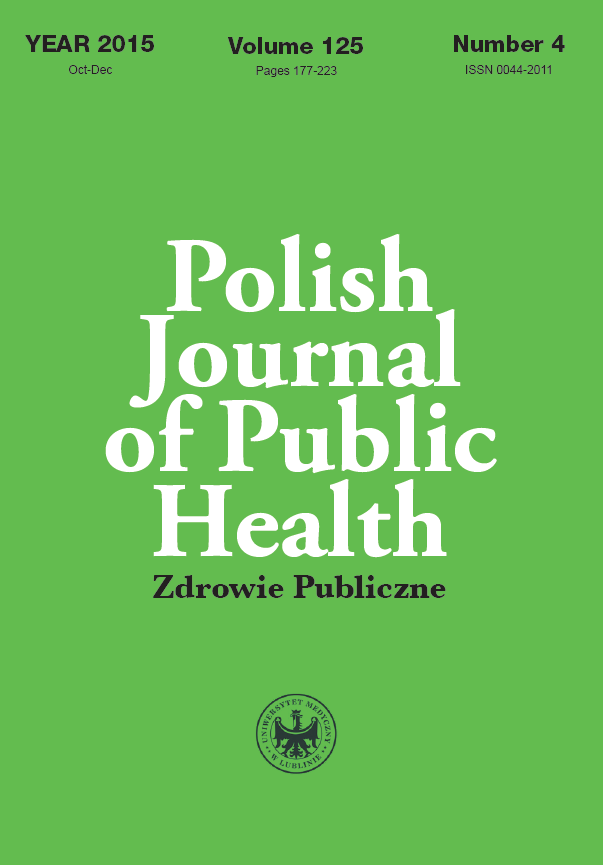Knowledge and attitudes of nursing students towards evidence-based medicine and evidence-based nursing practice
DOI:
https://doi.org/10.1515/pjph-2015-0055Keywords:
evidence-based medicine, evidence-based nursing practice, safety, nursing care qualityAbstract
Introduction. Modern nursing practice requires Nursing students to expand their knowledge both in the field of specialized nursing and learning the basics of medicine, as based on scientific evidence. The dissemination of research activities in nursing and the development of the profession, knowledge and practice based on Evidence-based Nursing may contribute to the increase of the effectiveness and improving the quality of healthcare services. Nursing teaching curricula should include subjects related to Evidence-based Medicine, such as scientific research methodology or critical analysis of scientific literature.
Aim. The aim of the study was to analyze the knowledge and attitudes of nursing students towards Evidence-based Medicine (EBM) and Evidence-based Nursing Practice (EBNP).
Material and methods. Out of 127 Master’s degree students in Nursing at the Medical University of Warsaw (4 men), 72% work as a nurse. Mean age of the study group was 26.55 years (min. 22, max. 51, SD=7.52) with 63% of the students attending full-time studies, with 90% being students of the first year. Some 53% earned their bachelor’s degree in Nursing in 2013.
A standardized Evidence – Based Practice Profile Questionnaire from University of South Australia, quantitative analysis of the study results.
Results. Nearly 30% of the respondents have never encountered EBM or EBNP during their time at the University (n=41). Most students intend to use relevant scientific literature in order to update their knowledge (n=68) and to upgrade their skills, so as to integrate EBNP into their everyday professional practice (n=67). Some 60% of the respondents deem scientific reports useful for their work (n=76) but nearly half of them regards clinical experience as more important than the results of scientific studies, when it comes to making the right decisions in their professional practice (n=56). Nearly a half of the studied group (n=66) have never heard about the term minimum clinically worthwhile effect and only one person declared the correct explanation systematic review (n=1). 42% declare reading published scientific studies once a month but nearly 30% have never referred scientific findings to their own diagnosis (n=41) and 40% have never assessed its methodological correctness (n=51).
Conclusions. 1. The educational programs in the framework of Nursing studies should be supplemented with subjects of EBM and EBNP, so as to expand the nursing students’ knowledge and let them reap the benefits of using the latest study results in their future professional practice. 2. The level of knowledge about the principles of assessment of reliability of scientific evidence was strongly insufficient and requires urgent supplementation of knowledge and skills of students in this area. 3. It is necessary for students to update their knowledge, particularly when it comes to using the latest scientific literature in everyday clinical practice and skills connected with critical analysis of scientific evidence.
References
1. Williams AB. Praktyka pielęgniarska oparta na faktach. Sztuka Pielęgnowania. 2013;4:14-5.
2. Gajewski P, Jaeschke R, Brożek J. Podstawy EBM czyli medycyny opartej na danych naukowych dla lekarzy i studentów medycyny. Kraków: Medycyna Praktyczna; 2008.
3. Kędra E. Praktyka pielęgniarska oparta na faktach – wymóg czy konieczność? Probl Pielęg. 2011;19(3):391-5.
4. Kózka M. Zastosowanie badań naukowych w praktyce pielęgniarskiej. Pielęg Epidemiol. 2007;2/3:13-5.
5. Adams S. Barron S. Use of evidence-based practice in school nursing: Prevalence, associated variables, and perceived needs. Worldviews on Evidence-Based Nurs. 2009;6:16-26.
6. Martin F. Why we do what we do: Implementation of practice guidelines by family nurse practitioner students. JAANP. 2008;10:515-21.
7. Aronson BS, Rebeschi LM, Westrick-Killion S. Enhancing Evidence Bases for Interventions in a Baccalaureate Program. Nurs Educ Perspect. 2007;5:57-62.
8. Jalali-Nia SF, Salsali M, Dehghan-Nayeri N, Ebadi A. Effect of evidence-based education on Iranian nursing students’ knowledge and attitude. Nurs Health Sci. 2011;13(2):221-7.
9. Logan PA, Angel L. Nursing as a scientific undertaking and the intersection with science in undergraduate studies: implications for nursing management. J Nurs Manag. 2011;9(3):407-17.
10. Florin JA, Ehrenberg AB, Wallin LA, Gustavsson PC. Educational support for research utilization and capability beliefs regarding evidence-based practice skills: A national survey of senior nursing students. JAN. 2012;68(4):888-97.
11. Morris JA, Maynard VB. The value of an evidence based practice module to skill development. Nurs Educ Today. 2007;27(6):534-41.
12. McEvoy MP, Williams MT, Olds TS. Evidence based practice profiles: Differences among allied health professions. BMC Med Educ. 2010;10:69 doi:10.1186/1472-6920-10-69.
13. Gijbels H, O’Connell R, Dalton-O’Connor C. A systematic review evaluating the impact of postregistration nursing and midwifery education on practice. Nurs Educ in Practice. 2010;10(2):64-9.
Downloads
Published
Issue
Section
License
Copyright (c) 2016 Polish Journal of Public Health

This work is licensed under a Creative Commons Attribution-NonCommercial-NoDerivatives 3.0 Unported License.


